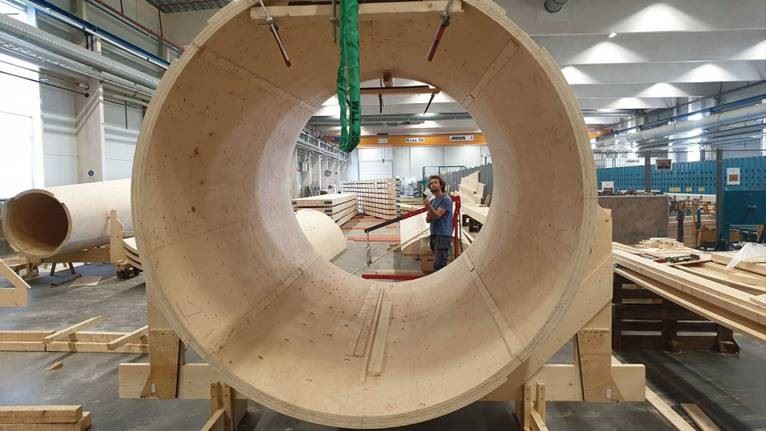Wooden tower set to reduce carbon dioxide footprint from future wind turbines

Vattenfall and Modvion have entered into collaboration on using wooden towers for onshore wind turbines, a venture expected to reduce carbon dioxide emissions in manufacturing by at least 25 percent. Vattenfall will be assessing Modvion's wooden tower for potential use in future wind farms.
"During their life cycles, Vattenfall's wind turbines already have very low levels of climate-impacting emissions. We want to drive those levels down even further. We see that wooden towers can be part of our solution for decreasing our carbon dioxide footprint, which can complement the work we are already doing with fossil-free steel as an example" says Daniel Gustafsson, Vattenfall's head of land-based wind power development in Sweden.
Approximately one quarter of the climate impact that arises when manufacturing wind turbines comes from the tower, normally constructed of steel and sometimes concrete. Going forward, steel will continue to be used in many parts of the wind turbines, but wooden towers can become an important addition. By building towers of wood, the carbon dioxide emissions caused by manufacturing can be radically reduced, while the carbon dioxide absorbed by trees as they grow is also stored in the wooden towers. In addition, certified sustainable wood raw material is used, which means, among other things, that new trees are planted.
"Vattenfall has solid experience of wind energy construction. By working together, we can hasten the development of the next generation of wind farms. With towers made of wood, wind power can potentially become fully climate neutral," says Otto Lundman, CEO of Modvion AB.
Modvion and Vattenfall have signed a letter of intent to enter into a business development project for evaluating building technology and commercialisation with the aim of supplying wooden towers to Vattenfall. Vattenfall's portfolio has the potential of approximately 5000 MW for projects on land, under development or in the process of being built on its various markets.
"We see great benefits in building wooden towers, not only for the climate, but also in lowering the cost of new, renewable electricity generation. We are determined to make fossil free living happen within one generation and this may be a vital step along the way," says Daniel Gustafsson.
For more information, please contact:
Otto Lundman, CEO, Modvion AB, +46 (0)702-72 06 24, otto@modvion.com
Magnus Kryssare, Press Officer at Vattenfall, +46 (0)76-769 56 07, magnus.kryssare@vattenfall.com
Facts on wooden wind turbine towers:
- Wooden towers are built in modules and assembled on site.
- The modular concept together with the lower weight of wood, enables higher towers to be built while still using normal roads for transportation.
- In April, Modvion erected the first wooden tower in Björkö outside Gothenburg, which is 30 metres tall. In 2022, the first commercial tower will be built.
About Modvion
Swedish wood technology company Modvion develops demanding designs made of laminated wood, nature's carbon fibre, for large-scale applications. Wooden designs enable radical reductions in emissions by replacing emission-heavy material such as steel and concrete. Thanks to their patented module system, Modvion has been able to develop wind towers at decreased manufacturing costs and more efficient transportation for installations of tall towers.



